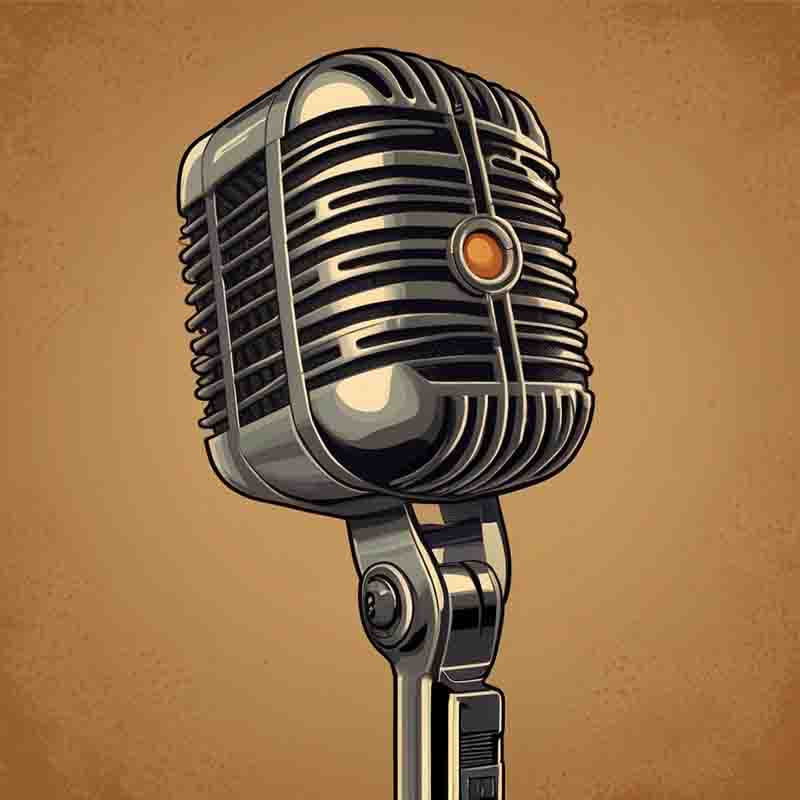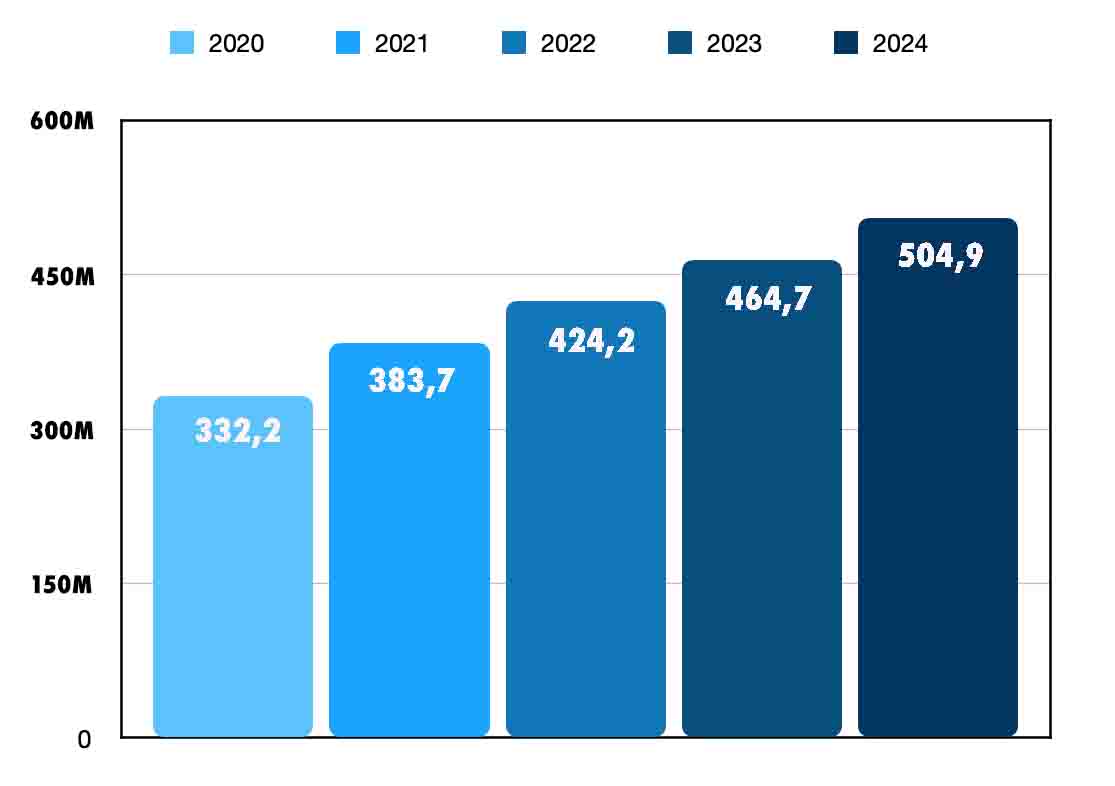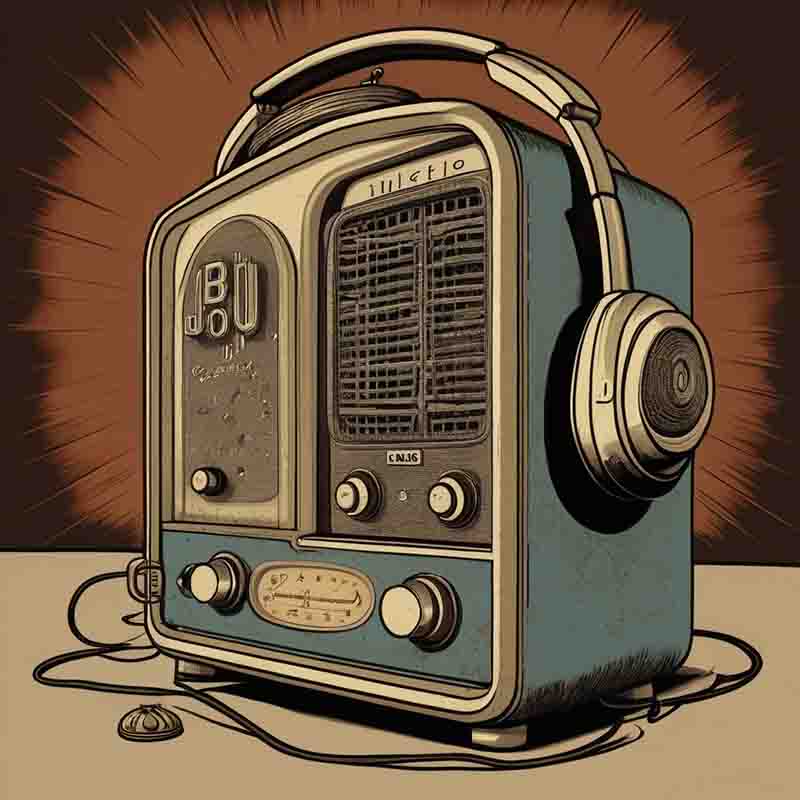Podcasting: The New Radio
A podcast is an audio-based content format distributed online, allowing listeners to enjoy episodes on-demand.

Podcasts are a modern way to consume content, offering listeners the freedom to tune in at their convenience.
A podcast is an audio program available on digital platforms.
People can stream or download episodes to listen at their convenience.
Podcasts follow a theme, ranging from storytelling and interviews to educational discussions, entertainment and online music players.
Podcasts are distributed through RSS feeds that allow listeners to subscribe and access new episodes automatically.
Music podcasts have become a significant segment within the podcasting industry, offering listeners in-depth explorations of new music, artist interviews, and the stories behind iconic songs.
They are hosted on platforms like Spotify, Apple Podcasts, Likewolf or Google Podcasts.
Content creators use recording tools, microphones, and editing software to produce episodes that meet quality standards.
As of 2024, there are over 3 million podcasts globally, with more than 500 million listeners, highlighting the medium's expansive reach and influence.

Global podcasting is a dynamic and rapidly expanding sector. As podcasting continues to evolve, it will offer new opportunities for both creators and listeners worldwide.
Types of Podcasts
-
Interview Podcasts: A host speaks with guests, exploring topics of interest.
-
Educational Podcasts: These focus on teaching skills or providing detailed information.
-
Storytelling Podcasts: Narratives, fiction, or true stories are presented in a series.
-
News Podcasts: Deliver timely updates on current events or niche industries.
-
Panel Discussions: Groups of experts share insights or debate issues.
-
Music: A music podcast is a type of podcast that focuses on music genres and musicians.
Podcasts cover a wide range of topics, such as storytelling, education, news, music, and entertainment, making them one of the most versatile mediums for information and engagement today.
12 Facts To Know About Podcast
-
Definition: A podcast is an on-demand audio program available for streaming or downloading online.
-
Content Variety: Podcasts cover diverse topics, including storytelling, education, news, music, and entertainment, catering to nearly every interest or niche.
-
Format: Episodes can be standalone or serialized, ranging from interviews and discussions to narrative storytelling.
-
Accessibility: Podcasts are available on platforms like Spotify, Apple Podcasts, Likewolf Podcast, and Google Podcasts, ensuring easy access for listeners worldwide.
-
Distribution: Creators use RSS feeds to distribute podcasts, allowing automatic updates for subscribers.
-
Production Tools: Essential tools include microphones, headphones, recording software, and editing programs like Audacity or Adobe Audition.
-
Audience Growth: Successful podcasts leverage social media, SEO, and promotional strategies to attract and retain listeners.
-
Monetization: Popular revenue streams include sponsorships, advertisements, listener donations, and branded merchandise.
-
Key Metrics: Performance is measured by downloads, streams, listener demographics, and engagement levels (e.g., reviews and ratings).
-
Ease of Entry: Starting a podcast is relatively low-cost compared to other content mediums, making it accessible for beginners.
-
Listener Benefits: Podcasts are portable and convenient, allowing audiences to consume content during commutes, workouts, or downtime.
-
Future Growth: Podcasting continues to expand globally, with advancements in technology improving production, analytics, and content discovery.
Podcast: Timeline
Podcasting has evolved from a niche technology to a global phenomenon.
As smartphones and streaming platforms like Spotify grew, podcasting continued to expand, becoming a preferred form of content for millions worldwide.
| Year | Milestone |
|---|---|
| 2000 | Origins of Podcasting: The term "podcast" is coined by journalist Ben Hammersley in a 2004 article for The Guardian. However, the concept of podcasting begins earlier with the development of RSS (Really Simple Syndication) feeds. These feeds allow audio content to be distributed through the internet. |
| 2001 | RSS Enclosures: Dave Winer, a software developer, and Adam Curry, a former MTV video jockey, develop the RSS feed with enclosures, allowing audio files to be embedded. This is a pivotal moment that enables podcasts to be distributed easily. |
| 2003 | First Podcast: Adam Curry creates the first podcast, "Daily Source Code," in 2003. It is one of the first shows to demonstrate the potential of podcasting. |
| 2004 | Podcasting Becomes Popular: The term "podcasting" is officially coined by journalist Ben Hammersley in his Guardian article. In the same year, Dave Winer and Adam Curry work together to build the first podcasting software, iPodder, which enables users to download and listen to podcasts on an iPod. |
| 2005 | Podcasting Breaks into the Mainstream: Apple includes podcast support in iTunes 4.9, giving podcasts widespread exposure. The first podcasts are made available through iTunes, bringing podcasting to millions of new listeners. |
| 2006 | Podcasting Growth: Podcasts start becoming a more recognized form of media, with shows across genres like news, comedy, and politics. Podcast advertising begins to emerge as a monetization method for creators. |
| 2007 | First Podcast Network: Podcasting networks like PodShow (later rebranded as Mevio) emerge, connecting creators and offering a platform for creators to syndicate their shows. |
| 2008 | Podcasting Popularity Peaks: The popularity of podcasts continues to rise. The Podcast Consumer 2008 report shows that nearly 20% of Americans have listened to a podcast. The first major podcast awards, the Podcast Awards, take place in 2005 and continue to highlight popular shows. |
| 2010 | Smartphone Apps Change the Game: As smartphones become more ubiquitous, podcast apps like Stitcher and Overcast launch, providing listeners with greater flexibility and easy access to podcasts on the go. |
| 2013 | Serial Launches: The true-crime podcast Serial, produced by This American Life producer Sarah Koenig, is released and becomes a cultural phenomenon. It is one of the first podcasts to gain a massive mainstream following, attracting millions of listeners. |
| 2015 | Podcast Advertising Growth: Podcast advertising becomes more sophisticated, with many brands embracing podcasts as a highly effective form of targeted marketing. The IAB Podcast Ad Revenue Report highlights an increase in ad revenue, signaling podcasting as a valuable medium. |
| 2016 | Podcasts on Demand: Podcast platforms like Spotify and Google Podcasts join the market, expanding accessibility and user choice. Spotify, in particular, plays a significant role in popularizing podcasts on a global scale. |
| 2018 | Spotify and Exclusive Deals: Spotify launches its first exclusive podcast content with The Joe Rogan Experience, signaling the beginning of a trend where large platforms seek exclusive deals with popular creators. |
| 2019 | Podcasting Becomes Mainstream: More brands and celebrities enter podcasting, including Michelle Obama, with The Michelle Obama Podcast. Podcasting grows in popularity across demographics, becoming a staple of daily entertainment and news consumption. |
| 2020 | Pandemic-Fueled Surge: As the COVID-19 pandemic forces people to stay home, podcast consumption surges. Many new creators join the space, and podcasts become a source of comfort, education, and entertainment during lockdowns. Podcasts also see increased attention from advertisers looking to reach home-bound audiences. |
| 2021 | Monetization & Podcast Networks Thrive: Podcast networks, such as Wondery and Gimlet Media, continue to thrive and are acquired by large media companies like Amazon and Spotify. Additionally, podcasting platforms introduce new ways to monetize content, such as paid subscriptions, listener donations, and exclusive content. |
| 2022 | Podcasting Expands Globally: Podcasts see rapid growth in non-English speaking countries, with platforms such as Spotify and Apple Podcasts pushing international expansion. This year marks a global explosion in both podcast consumption and creation, with localized content appealing to diverse international audiences. |
| 2023 | AI and Podcasting Innovation: Artificial intelligence tools start gaining traction in the podcasting world, helping creators with automated transcription, editing, and content optimization. The demand for podcasts remains high, with new formats and technologies further enhancing the listener experience. |
| 2024 | Future of Podcasting: Podcasts continue to diversify, and emerging technologies such as interactive podcasts and voice-driven content become more mainstream. The potential for AI-driven podcast creation and deeper integrations with virtual assistants and smart devices increases the convenience and accessibility of podcasts. |
This timeline captures the key moments in podcasting history, from its inception to its rise as a mainstream form of media.
What Makes a Podcast Stand Out

With millions of podcasts available, you're bound to find a series that resonates with your interests, making it easy to discover new content every day.
What is a Podcast?
A podcast is an audio show distributed digitally, typically in episodic formats.
It can be streamed or downloaded, depending on the listener's preference.
What makes podcasts stand out from traditional radio is their on-demand nature, which allows listeners to tune in whenever they choose, on whatever device they prefer, be it a smartphone, computer, or smart speaker.
Unlike radio, which operates in real-time, podcasts are available at any time, making them highly convenient for modern, busy lifestyles.
Podcasts cover a wide range of topics—from news and politics to niche hobbies, self-help, storytelling, and comedy.
They can range from highly produced shows with scripted dialogue and sound effects to more casual, unscripted conversations between hosts.
What unites all podcasts is the desire to offer information or entertainment in an easily accessible format that people can consume on the go.
This flexibility makes podcasts a top choice for people who want to consume content while commuting, exercising, or even cleaning the house.
Why Are Podcasts Popular?
Podcasts have gained incredible popularity in recent years. A major reason for this is convenience.
They allow listeners to multitask—something that traditional forms of media like television don’t offer.
The ability to listen while doing other activities, such as driving, running, or cooking, is a game-changer for busy people.
You can plug in your headphones and get informed or entertained without interrupting your daily routines.
Another factor driving their popularity is the sheer diversity of content.
Whether you're interested in true crime, tech news, cooking tips, personal development, or niche fandoms, there’s a podcast for just about everything.
This wide variety allows listeners to find shows that perfectly match their tastes and preferences.
Podcasts cater to people’s specific interests in a way that traditional media cannot.
Additionally, the intimate nature of podcasting fosters a strong sense of connection between the host and the audience.
Because podcasts are primarily an audio medium, listeners often feel like they are in a one-on-one conversation with the host, which can build trust and loyalty.
Measuring Podcast Performance
Tracking how well your podcast is performing is key to refining content and growing an audience.
-
Downloads: How many times an episode has been downloaded or streamed.
-
Engagement: How often listeners share episodes, comment, or leave reviews.
-
Audience Growth: Whether a listener base is growing over time. There are several tools to help track these metrics, including Spotify for Podcasters, Google Analytics, and podcast hosting services that provide detailed statistics.
There are several tools to help track these metrics, including Spotify for Podcasters, Google Analytics, and podcast hosting services that provide detailed statistics.
Common Challenges in Podcasting
While podcasting offers incredible opportunities, there are also some common challenges podcasters face.
One major challenge is standing out in a crowded market.
There are millions of podcasts available, so carving out a unique niche is essential to attracting listeners.
Consistency is another hurdle.
Podcasting requires regular publishing schedules, which can be hard to maintain, especially when balancing production, promotion, and other responsibilities.
Listener retention is another common problem.
The ease of moving from one podcast to another can result in a lot of “churn”—listeners dropping off after only a few episodes.
Finding ways to engage and re-engage listeners is key to long-term success.
Future of Podcasts
The future of podcasting looks bright.
With the growth of mobile technology and the increasing popularity of smart speakers like Amazon Alexa and Google Home, podcasts are more accessible than ever.
Additionally, innovations like interactive podcasts and podcast video formats are beginning to shape the next phase of the medium.
Podcasting will continue to evolve, and as it does, it will offer new opportunities for both creators and listeners alike.
Podcasts: Changing the Way We Consume Media
In recent years, podcasts have emerged as one of the most influential and widely consumed forms of media.
Podcasts are delivered in audio format, usually as MP3 files.
These files are uploaded by creators to podcast hosting platforms, which distribute them across podcast directories.
Once published, podcasts can be streamed or downloaded by listeners at any time, on-demand.
Episodes can range in length from just a few minutes to several hours.
Many podcasts are structured around recurring themes, guest interviews, storytelling, or discussion panels.
-
Podcast Episodes: Podcast episodes refer to individual audio or video installments that make up a podcast series. Each episode typically explores a specific topic or theme and can vary in length, ranging from a few minutes to several hours. These episodes are typically released on a regular schedule, whether weekly, bi-weekly, or monthly.
-
Audio Content: Audio content in the context of podcasts refers to the spoken material that is distributed as a podcast. It can include interviews, commentary, storytelling, or educational information. This is the core medium for podcasts, offering a personal and engaging way to communicate ideas, share stories, or discuss various subjects.
-
Podcast Platform: A podcast platform is an online service where podcasts are hosted and made available for listeners. Popular platforms include Spotify, Apple Podcasts, Google Podcasts, Likewolf Podcast, and Stitcher. These platforms allow listeners to search for, subscribe to, and listen to podcasts across a range of devices.
-
Streaming Podcast: A streaming podcast refers to a podcast that can be listened to in real-time via an internet connection, rather than being downloaded first. Streaming platforms like Spotify and Apple Podcasts allow listeners to access podcasts instantly without the need to download the file to their device.
-
Podcast Hosting: Podcast hosting involves storing and managing podcast episodes on a server, making them available for download or streaming. A podcast host provides the infrastructure necessary to distribute the content across multiple platforms, with popular hosts like Libsyn, Buzzsprout, and Podbean.
-
Podcast Topics: Podcast topics are the central themes or subjects that each podcast or episode covers. Topics can vary widely, from niche subjects like true crime, history, or technology, to more general categories like entertainment, news, or personal development. Choosing the right podcast topic helps attract the right audience.
-
Podcast Production: Podcast production is the process of creating, recording, editing, and finalizing podcast episodes. This includes writing scripts, recording voiceovers, incorporating music or sound effects, and editing the audio for clarity and quality. Successful podcast production ensures a polished and professional final product.
-
Podcast Editing: Podcast editing is a critical part of the podcast creation process. It involves removing mistakes, background noise, unnecessary pauses, and other imperfections. Editing can also include adding intros, outros, sound effects, and transitions to improve the overall flow and quality of the episode.
-
Podcast Equipment: Podcast equipment refers to the hardware used to record, edit, and produce podcasts. This can include microphones, headphones, audio interfaces, pop filters, and soundproofing tools. High-quality equipment helps ensure clear, professional-sounding audio, which is key to listener satisfaction.
-
Podcast Promotion: Podcast promotion is the process of increasing the visibility of a podcast and attracting more listeners. Methods can include social media marketing, cross-promotion with other podcasters, guest appearances, and email newsletters. A strong promotional strategy helps grow a podcast’s audience.
-
Podcast Growth: Podcast growth refers to increasing the audience size and engagement of a podcast. This can be achieved through content quality, effective promotion, listener interaction, and partnerships. Growing a podcast’s audience often requires time, consistent effort, and the right marketing strategies.
-
Podcast Audience: A podcast audience is the group of listeners who regularly tune in to a podcast. Audience demographics can vary greatly depending on the podcast’s topic, tone, and target market. Understanding your podcast audience is key to tailoring content and improving engagement.
-
Podcast Format: Podcast format refers to the structure and style in which a podcast is presented. Common formats include interview-based shows, solo commentary, storytelling, or panel discussions. The format should align with the podcast’s theme and the preferences of the target audience.
-
Podcast Subscription: Podcast subscription allows listeners to receive new episodes automatically as they are released. Subscribing to a podcast on a platform like Apple Podcasts or Spotify helps listeners stay updated with new content and ensures they never miss an episode.
-
Podcast RSS feed: A podcast RSS (Really Simple Syndication) feed is a file that allows podcast episodes to be automatically distributed to podcast directories. This feed contains information about each episode (title, description, audio file location), allowing listeners to subscribe and receive updates directly.
-
Podcast Distribution: Podcast distribution involves sharing and making podcast episodes available across different platforms. A podcast’s RSS feed is submitted to directories like Spotify, Apple Podcasts, Google Podcasts, and Stitcher. Proper distribution increases a podcast’s reach and helps attract more listeners.
-
Podcast Branding: Podcast branding refers to the visual and audio identity of a podcast. This includes the podcast logo, colors, intro/outro music, and overall style. Strong branding helps create recognition and attracts listeners, contributing to a podcast's overall success.
-
Podcast Monetization: Podcast monetization refers to generating revenue from a podcast. Common strategies include sponsorships, ads, listener donations (via Patreon or other platforms), and offering paid content or merchandise. Monetization often becomes viable once a podcast has gained a large and loyal following.
-
Podcast Marketing: Podcast marketing is the process of promoting a podcast to attract listeners and grow its audience. This can involve using social media, collaborations with other creators, creating teaser clips, optimizing podcast descriptions for SEO, and running targeted ad campaigns.
-
Podcast Analytics: Podcast analytics are metrics that help podcasters track the performance of their episodes and audience engagement. These metrics can include download numbers, listener demographics, average listen time, and geographic location of listeners. Analytics help podcasters improve content and understand their audience better.
Podcasts in Today’s Media Landscape
Podcasts provide a flexible, engaging way to connect with audiences on a personal level, while also offering unique opportunities for content creators.
Whether you’re a listener looking for entertainment or a creator thinking about starting your own show, podcasts offer an endless array of possibilities.
It’s a medium that’s growing, evolving, and, most importantly, here to stay.
Podcast: FAQ
Are you curious about music, art, technology, fashion, lifestyle, and beer?
If so, then you need to subscribe to the free Likewolf newsletter.
100% privacy. When you sign up, we'll keep you posted.

Likewolf's Typewriter
Likewolf writes about music, art, technology, fashion, lifestyle, and beer
LikewolfTimeless Elegance
Experience the Extraordinary